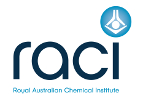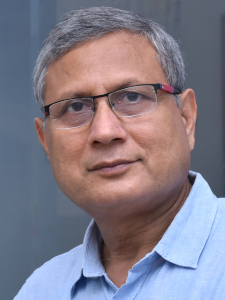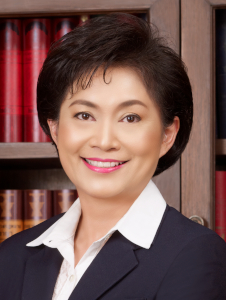Participating Societies
 |
The Royal Australian Chemical Institute Inc. (RACI) |
 |
Chemical Research Society of India (CRSI) |
|
 |
(HKCS) |
 |
(CSJ) |
|
 |
(HKI) |
 |
(IKM) |
|
 |
(KCS) |
 |
Singapore National Institute of Chemistry (SNIC) |
|
 |
New Zealand Institute of Chemistry (NZIC) |
 |
(CST) |
|
 |
Chemical Society Located in Taipei (CSLT) |
 |
Supporting Organization Federation of Asian Chemical Societies (FACS) |
|
 |
(CSV) |
ACES Representatives
|
Roger Stapleford |
The Royal Australian Chemical Institute Inc. The Royal Australian Chemical Institute is Australia’s professional membership organization for those involved in the chemical sciences. It is one of the oldest national scientific organizations in the country, having been established in 1917, and has a membership of over 4500. Roger Stapleford, the chief executive officer, is the RACI’s representative to ACES. He has a broad background having obtained a BSC (hons), B.Com, MBA and CPA and has worked in mineral processing, rubber and the textiles industries before joining the RACI. |
||
|
|
|||
|
Wai-Yeung Wong |
The Hong Kong Chemical Society (HKCS) was established in 1978 to disseminate knowledge in the chemical sciences, foster its application, and facilitate collaboration among chemists, as well as between chemists and scientists in related disciplines. Society members are primarily faculty members from local tertiary institutions and professional researchers from chemical companies. ACES representative Wai-Yeung Wong is Professor at the Hong Kong Polytechnic University. |
||
|
|
|||
|
Chemical Research Society of India The Chemical Research Society of India (CRSI) was established in 1999 as part of the 50th anniversary of the country’s independence. Govindasamy Mugesh is the ACES representative of the CRSI. He received his PhD from the Indian Institute of Technology, Bombay, followed by postdoctoral training at the Technical University of Braunschweig, and the Scripps Research Institute, La Jolla. He has been a faculty member at the Indian Institute of Science, Bangalore, since 2002 with research focusing on chemical biology. Vinod Singh is currently a Chair Professor at IIT Kanpur. He did his Ph.D. with Dr. Sukh Dev in 1986 from M.S. University Baroda. He spent two years in Canada (University of Calgary & UBC Vancouver) and three years in the USA (Harvard University; Advisor: E.J. Corey) as a postdoctoral fellow. After a brief stint at Neurogen Corp, he joined IIT Kanpur in 1990 as an Assistant Professor and rose to the rank of Professor. |
||
|
|
|||
|
|
Muhamad A. Martoprawiro |
||
|
|
|||
|
The Chemical Society of Japan was founded in 1878 and has a membership of 30,000. Its prime mission is to promote chemistry for the betterment of human life in collaboration with other domestic and global societies. Current focuses are to invite more Asian and foreign speakers to the CSJ Annual Meeting and to increase the global visibility of the society’s journals. The CSJ representatives to ACES are Kazuyuki Tatsumi, Professor at Nagoya University, and Mitsuo Sawamoto, Executive Director of the CSJ and Professor at Chubu University. |
||
|
|
|||
|
Seokmin Shin |
The Korean Chemical Society was founded in 1946 as the first learned society established in Korea and boasts 7,000 personal members, 140 organization members and 30 cooperation members. The KCS provides various platforms for chemical scientists to exchange ideas, to recognize outcomes, and to promote research activities. Seokmin Shin is the ACES representative of the KCS. He received his Ph.D. from the University of Chicago, followed by postdoctoral training at the University of California, Santa Barbara. He has been a Professor of Chemistry at Seoul National University since 1995 and the chair of chemistry department since 2013. His research concerns the development of theories, mathematical frameworks and computational methods for describing dynamics of complex molecular systems. |
||
|
|
|||
|
Ong Eng Long |
|||
|
|
|||
|
Paul Plieger |
New Zealand Institute of Chemistry The New Zealand Institute of Chemistry was founded in 1931 and has 810 members. It serves the interests of research, industrial and educational chemists in New Zealand with activities based in six branches at the University centers. A national conference is run every two years. The society’s journal, Chemistry in New Zealand, promotes the work of NZIC and NZ chemists and is published four times a year. Paul Plieger has a research background in the field of ligand design and synthesis. He works at Massey University, is the NZIC Past President and represents the Institute in ACES. |
||
|
|
|||
|
Andy Hor |
Singapore National Institute of Chemistry The Singapore National Institute of Chemistry (SNIC) was established in March 1970 to represent the interest of chemists in Singapore and promote chemistry as a discipline in teaching and learning, research and professional development, as well as public and community services. It was among the founding members of the Federation of the Asian Chemical Societies (FACS) and the Singapore National Academy of Science (SNAS). It is represented in ACES by its past president Andy Hor, who is Deputy Chief Executive at the Agency for Science, Technology and Research (A*STAR) in Singapore. He is also past president of FACS. |
||
|
|
|||
|
Chien-Tien Chen |
Chemical Society Located in Taipei The Chemical Society Located in Taipei (CSLT) was established in Nanjing in 1932 and reestablished in Taiwan in 1950 to promote the chemical sciences in academic research, education, and daily life. The CSLT representative to ACES is Chien-Tien Chen, who received his PhD from the University of Illinois and performed postdoctoral research at the Scripps Research Institute. He began his independent academic career at National Taiwan Normal University and has been Distinguished Professor at National Tsing-Hua University since 2010. |
||
|
|
|||
|
Supa Hannongbua |
The Chemical Society of Thailand (CST) was founded in 1979 and concomitantly became a founding member of the Federation of Asian Chemical Societies. Supa Hannongbua is a Professor in Chemistry at Kasetsart University. Her research interests include computer-aided molecular design for drug discovery on anti-viral and tropical diseases and also advanced optical materials. |
||
|
|
|||
|
Nguyen Viet Bac |
The Chemical Society of Vietnam (CSV) was established in 1989. The society has 3500 members, including organizations and scientists, technicians and managers working in universities, institutes and enterprises of chemistry and chemical industry. Nguyen Viet Bac is the ACES representative of CSV. He received his Ph.D. from Bucharest University of Technology in 1979. He was Associate Professor from 1991 to 2001 and since 2001, he has been Professor with research focusing on polymeric and composite materials. He is Vice-President of the CSV, where he is responsible for international relations. |
||












